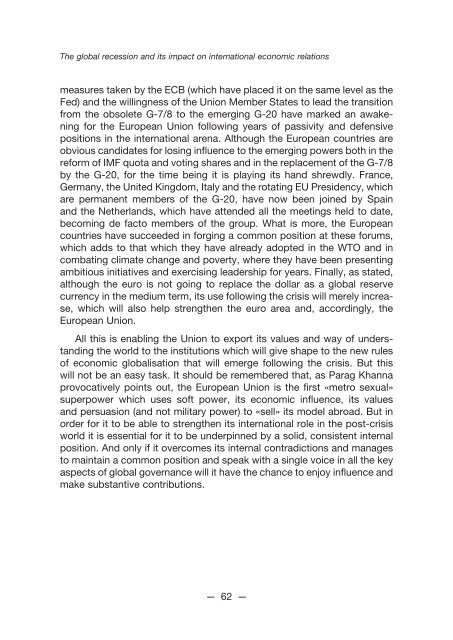Strategic Panorama 2009 - 2010 - IEEE
Strategic Panorama 2009 - 2010 - IEEE
Strategic Panorama 2009 - 2010 - IEEE
You also want an ePaper? Increase the reach of your titles
YUMPU automatically turns print PDFs into web optimized ePapers that Google loves.
The global recession and its impact on international economic relations<br />
measures taken by the ECB (which have placed it on the same level as the<br />
Fed) and the willingness of the Union Member States to lead the transition<br />
from the obsolete G-7/8 to the emerging G-20 have marked an awakening<br />
for the European Union following years of passivity and defensive<br />
positions in the international arena. Although the European countries are<br />
obvious candidates for losing influence to the emerging powers both in the<br />
reform of IMF quota and voting shares and in the replacement of the G-7/8<br />
by the G-20, for the time being it is playing its hand shrewdly. France,<br />
Germany, the United Kingdom, Italy and the rotating EU Presidency, which<br />
are permanent members of the G-20, have now been joined by Spain<br />
and the Netherlands, which have attended all the meetings held to date,<br />
becoming de facto members of the group. What is more, the European<br />
countries have succeeded in forging a common position at these forums,<br />
which adds to that which they have already adopted in the WTO and in<br />
combating climate change and poverty, where they have been presenting<br />
ambitious initiatives and exercising leadership for years. Finally, as stated,<br />
although the euro is not going to replace the dollar as a global reserve<br />
currency in the medium term, its use following the crisis will merely increase,<br />
which will also help strengthen the euro area and, accordingly, the<br />
European Union.<br />
All this is enabling the Union to export its values and way of understanding<br />
the world to the institutions which will give shape to the new rules<br />
of economic globalisation that will emerge following the crisis. But this<br />
will not be an easy task. It should be remembered that, as Parag Khanna<br />
provocatively points out, the European Union is the first «metro sexual»<br />
superpower which uses soft power, its economic influence, its values<br />
and persuasion (and not military power) to «sell» its model abroad. But in<br />
order for it to be able to strengthen its international role in the post-crisis<br />
world it is essential for it to be underpinned by a solid, consistent internal<br />
position. And only if it overcomes its internal contradictions and manages<br />
to maintain a common position and speak with a single voice in all the key<br />
aspects of global governance will it have the chance to enjoy influence and<br />
make substantive contributions.<br />
— 62 —

















